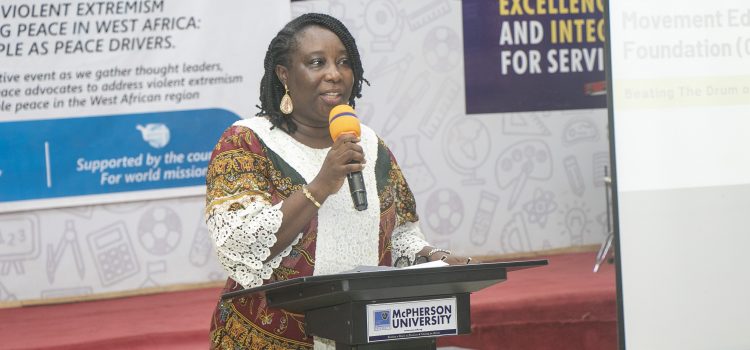The Directorate of Student Affairs, McPherson University, Seriki Sotayo, Ogun State, in collaboration with the Cultural Youth Movement Education Foundation, recently organized a public lecture titled “Addressing Violent Extremism and Promoting Peace in West Africa: Young People as Peace Drivers.” The event brought together scholars, peace advocates, and young changemakers to discuss solutions to violent extremism and promote peacebuilding efforts in the region.
A major highlight of the event was a drama performance staged by students, creatively depicting the dangers of violent extremism and the consequences of youth involvement in conflict. The play showcased real-life scenarios of how radical ideologies spread and the devastating impact they have on individuals, families, and society. Through the drama, students were urged to embrace dialogue, tolerance, and peaceful conflict resolution instead of resorting to violence.
In his keynote address, Deacon Adebayo Anthony, the Executive Director of the Cultural Youth Movement Education Foundation, emphasized the foundation’s mission to empower young people and marginalized communities across Africa. He highlighted the organization’s efforts in peace and security, democracy, human rights, and conflict resolution across 90 higher institutions in Nigeria.
Speaking at the event, the Vice-Chancellor of McPherson University, Professor Francis Igbasan, who was ably represented by the Institution’s Acting Librarian, Dr. Abiola Omotoso, reiterated the crucial role of young people in countering violent extremism. He described youth as “agents of change”and emphasized that their energy, innovation, and resilience could be channeled toward building a peaceful and progressive society.
The Vice-Chancellor also urged students to take the lessons from the drama seriously and apply them in their daily lives. He noted that violent extremism remains a serious threat to national security and development, making it necessary for young people to become advocates of peace and unity in their communities.
The event featured interactive sessions, where students and experts discussed diplomatic advocacy, conflict resolution strategies, and the role of education in preventing radicalization. Participants were encouraged to reject ideologies that promote violence and instead focus on building relationships that foster national and regional stability.
The program concluded with a call to action for students to serve as peace ambassadors within their schools and communities.
Participants expressed optimism that, with continuous efforts from educational institutions, civil society organizations, and government agencies, a peaceful and prosperous West Africa can be achieved.










